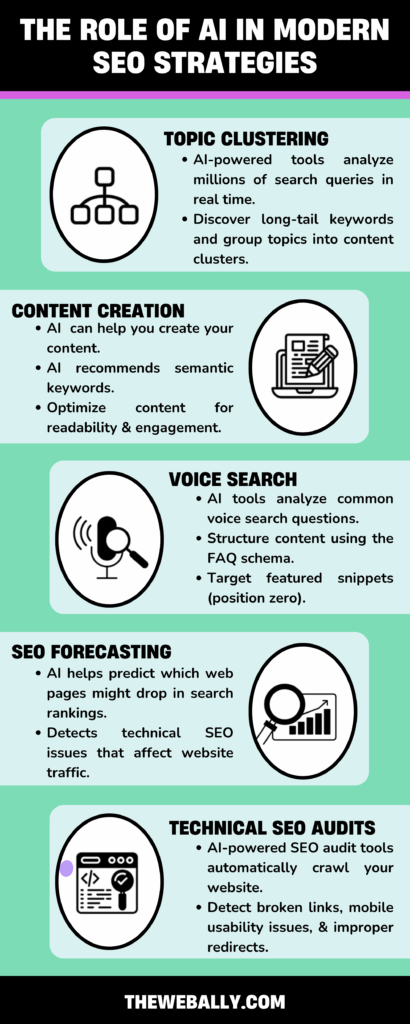Search Engine Optimization (SEO) has always evolved alongside technology, but the rise of Artificial Intelligence (AI) has redefined the rules of the game.
What once relied heavily on manual keyword research and backlink building now increasingly depends on machine learning, natural language processing (NLP), and predictive analytics.
For digital marketers, understanding the role of AI in modern SEO is no longer optional—it’s essential. This post explores how AI is transforming SEO and how your business can harness it for sustainable growth.
Search engines like Google are already driven by AI. Google’s RankBrain, BERT, and MUM algorithms use machine learning and NLP to interpret queries, understand user intent, and deliver more relevant results.
So if Google is using AI to rank your site, it only makes sense to use AI to optimize it.

AI-powered tools analyze millions of search queries in real time, helping marketers:
Tools like Surfer SEO, Clearscope, and MarketMuse use AI to suggest keyword-rich outlines based on top-performing pages.
AI helps decode what users actually want—not just what they type. Instead of guessing whether a query like “best CRM software” is informational or transactional, AI analyzes SERP features, content formats, and query patterns to clarify intent.
Understanding user intent lets you:
AI doesn’t just analyze content—it can help create it. AI writing tools like ChatGPT, Jasper, and Copy.ai can generate blog outlines, meta descriptions, headlines, and even full articles.
More importantly, they:
Pro Tip: AI-generated content still needs human editing to align with brand voice, add expertise, and avoid generic outputs.
AI-driven SEO considers how people speak, not just how they type. With more voice queries happening daily, optimizing for conversational language and natural phrasing is crucial.
AI tools help:
Using AI, marketers can predict:
Tools like BrightEdge, SEMRush’s Sensor, and Google Search Console Insights use machine learning to provide these forecasts.
This allows SEOs to be proactive, not reactive.
AI-powered SEO audit tools automatically crawl your website and detect:
Some can even prioritize issues based on SEO impact, saving you time and effort.
Examples: Screaming Frog SEO Spider, Ahrefs Site Audit, and DeepCrawl.
Search engines increasingly use computer vision (a subset of AI) to understand media content.
To stay ahead:
Some tools (like Cloudinary or Lumen5) even use AI to auto-generate captions or compress media for faster loading.
Google’s algorithm uses UX signals—like bounce rate, dwell time, and engagement—as ranking factors.
AI chatbots:
The better the user experience, the stronger the SEO performance.
While AI offers incredible advantages, it’s not without risks:
The solution? Combine AI-powered efficiency with human creativity and expertise.
Start by identifying AI-capable tools you already use—Google Analytics, Search Console, Ahrefs, etc.—and explore their predictive or automated features.
Use AI to research, plan, and outline content, then finalize with human editing to maintain originality and brand tone.
Stay informed on how Google’s AI is evolving (e.g., Helpful Content Updates, MUM). Tailor your SEO strategy accordingly.
Avoid spammy tactics or over-reliance on automation. Google penalizes manipulative practices—even if they’re AI-assisted.
Ensure your SEO and content teams are familiar with AI tools, capabilities, and limitations. AI should augment, not replace, your team.
AI is revolutionizing SEO by making it more data-driven, efficient, and user-focused. From keyword research and content optimization to predictive analytics and voice search, the integration of AI provides a significant competitive edge.
But at the core of every successful SEO campaign is still a human understanding of audience needs, brand identity, and creative storytelling. When used responsibly, AI doesn’t replace strategists—it empowers them.
The Web Ally combines cutting-edge AI tools with expert strategy to deliver performance-driven SEO that adapts with the future. Reach out today to see how we can elevate your search visibility.
Self-service covers every aspect of life these days, but we still believe in the power of having someone to talk to. Maybe it's to bounce off ideas and explore new opportunities. Maybe it's just to say hello.
In any case, we will only use your contact details to get in touch with you regarding your enquiry - and nothing else!